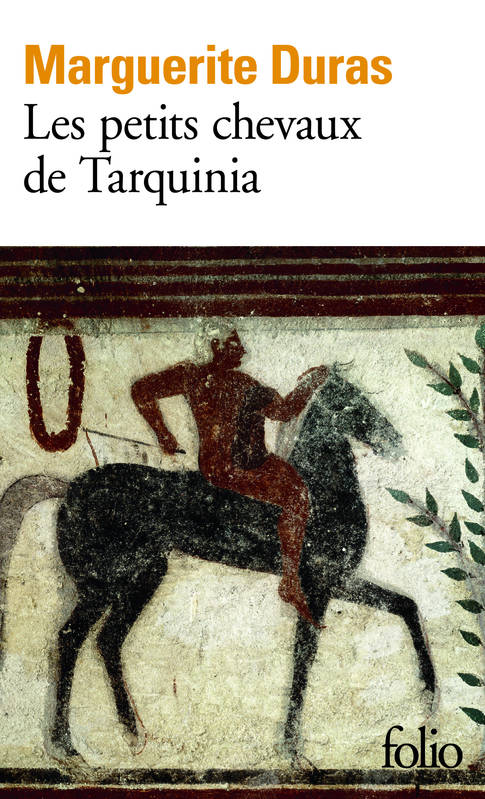One of the pitfalls of my English education is that I ended up with a huge blind spot when it comes to contemporary authors. It’s not anyone’s fault in particular; it’s just how my course load worked out. Though, I don’t know if Marguerite Duras would have ended up on my English curriculum. Maybe French, if I’d taken more than two semesters.
Duras didn’t even become a familiar name to me until a couple of features over on LitHub. Then, browsing a small (and predominantly Farsi?) international bookstore in Stockholm, back in the before times, I noticed a Duras title in the French section: Moderato Cantabile. It also looked mercifully short, something that I could probably manage with my limited French. Manage I did, and so I began scouring Stockholm library for other books by Duras. Les petits chevaux de Tarquinia was the first to meet my requirements of being available in Swedish as well as French.
Not a lot happens in Les petits chevaux. We have five Parisians on vacation together in a sleepy Mediterranean village, two couples (Sara and Jacques, Ludi and Gina) and the freewheeling Diana, stuck in their rut of swimming, bocce, and endless Camparis until they’re knocked out of their orbits when a new vacationer shows up with a boat. Sara is immediately attracted to him, their flirting eventually leads to a tryst, but then in the end Sara decides to go on a trip to Tarquinia with Jacques and Diana rather than to stay behind and have an extended affair. At the same time, they’ve all become involved in looking after an elderly couple in the village who have arrived to claim the remains of their son. He was killed in the course of his work to decommission leftover landmines and now everyone is waiting for the mother to change her mind and sign the death certificate. There’s also a forest fire at some point?
It sounds like a literary Seinfeld episode (“She wouldn’t sign the death certificate, Jerry, would you believe it?”), which is also how I’d describe Moderato Cantabile, but somehow it works. Maybe because of the undercurrent of “will they, won’t they” sexual tension that appears in the first conversation between Sara and Boat Guy and persists throughout the entire book. Maybe it’s because Duras lets her characters have pretentious philosophical conversations that are usually the purview of stoner insights. Maybe it’s because even though on one level, nothing happens, there’s also a lot of nothing that happens: people go on boat rides, go swimming, have dinner, hike up and down the mountain to visit the mourning couple. If everyone just sat around in the bar drinking, it might come off entirely differently.
At any rate, this kind of slow, ponderous, talk-y book is exactly my jam. Which is good since I essentially read it three times (French first, then Swedish to fill in the gaps, then French one last time). I don’t know that I have any quibble with Suzanne Palme’s translation, either. Palme also seems to have passed away, but since her obituary is paywalled at DN I don’t know more than what journalisten.se has to say:
Suzanne Palme
26 OKTOBER, 2000 | Oslo, har avlidit vid 73 års ålder. Hon arbetade en tid som vikarie på Göteborgs Handels- och Sjöfartstidning innan hon övergick till förlagsbranschen.
I assume that’s the right Suzanne Palme, at any rate. According to boksampo, she has just half a dozen or so translations to her name. They’re a rather scattershot collection; De små hästarna is the only Duras novel there.

